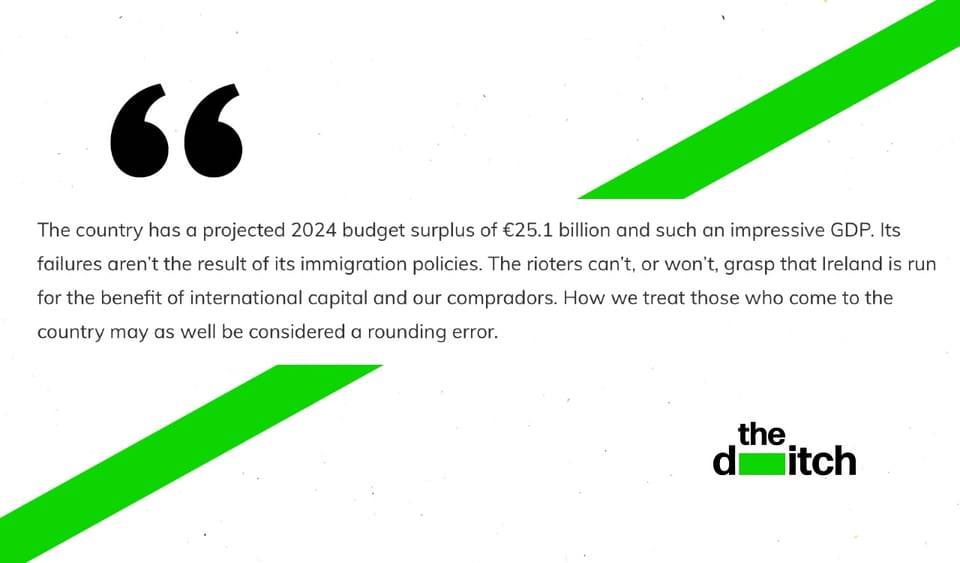I mean the shit was all bad just a week ago
- J Cole
A country that is, ideologically, firmly western, whose government seeks any foreign investment it can entice, which is unquestioning of the rules of the international economy and unwilling to build material alliances with the Third World; a country that maintains reasonable, on paper, GDP growth primarily from this foreign investment and whose seemingly stable government can trace its lineage back to some kind of shared national history.
Ireland’s middle-aged professional classes read that description and think, “Great!”
It’s a paraphrase of how Vincent Bevins described 1960s Brazil and Indonesia, subjects of US-backed coups before becoming de facto US colonies, client states whose primary functions during the Cold War were their contributions to the maintenance of US global hegemony. Another feature of these client states was who among their citizenries benefited from the choices their governments had made: a small stratum of native elites, at the expense of everyone else, according to Bevins. “The logic of survival required people to attach themselves to a corrupt, rapacious, and wasteful apparatus at the top of society or risk falling into the abyss themselves, and become a poorly paid worker in the extraction machine,” he wrote in The Jakarta Method.
Ireland’s middle-aged professional classes may still think, “Great!”
We don’t have to adopt the auld Only in Ireland shtick.
US capital didn’t carry out a coup in Ireland. (Our old taoiseach only held a private meeting with one of the world’s most ruthless landlords, the man who said, when explaining the right time to buy property, “You want to wait until there's really blood in the streets," and encouraged him to help himself to as many of the country’s distressed post-crash assets as he liked). Washington doesn’t explicitly dictate to us what our foreign policy should be. (Leo Varadkar just tells his Fine Gael colleagues that “statements which are critical of Israel can impact US attitudes towards Ireland'', warning that Irish support for Palestine may cause US multinationals to reconsider their investment in Ireland).
Confronting and accepting the choices the Irish state has made can be hard. It’s hard for the national ruling class across our political, media and business communities, who when considering last week’s riot in Dublin city centre, incant, This isn’t us. This isn’t Ireland. We’re better than this. It’s hard for the progenitors of that riot, those in Irish (pick your term – they’re sensitive boys) conservative/right/far right/nationalist/fash circles who settle on Ireland is full as their own incantation. (Full of foreign workers, they think; these people never seem as animated about the foreign property funds embedded in the country).
Three horrific attacks in Ireland – the murders of Ashling Murphy, Aidan Moffitt and Michael Snee and the stabbing of children and a carer at Gaelscoil Choláiste Mhuire – with two immigrants convicted and another a garda suspect. The Irish far right, coalesced around increasingly violent anti-immigration sentiment, come together in Dublin city centre. They, along with the less dogmatic but equally enthusiastic, burn out buses and Luases and garda cars; they loot Foot Locker and Brown Thomas and Arnotts and contribute to scenes of civil unrest that haven’t been seen in Ireland since the northern conflict. These rioters seem to grasp that something isn’t right with a country that can’t provide for its people.
The country has a projected 2024 budget surplus of billions and such an impressive GDP. Its failures aren’t the result of its immigration policies. The rioters can’t, or won’t, grasp that Ireland is run for the benefit of international capital and our compradors. How we treat those who come to the country may as well be considered a rounding error.
Say hello to my little loaf of bread
Some were sympathetic to the rioters’ cause.
Conor McGregor, that amalgam of Tony Montana and Old Mr Brennan, told us “we are at war”. People in the US who share McGregor’s class interests say the same thing. “There's class warfare, all right,” according to Warren Buffet, “but it's my class, the rich class, that's making war, and we're winning.” Another billionaire, Ray Dalio, has shared his fear of “actual class war” in a forum of other billionaires who articulated similar. Another who agreed with McGregor, more than 100 years ago, was Vladimir Lenin who in 1913 wrote, “In Dublin… the class struggle, which permeates the whole life of capitalist society everywhere, has become accentuated to the point of class war.”
The Irish ruling class doesn’t like this. Adopting the tone of Livia Soprano – I don’t like that kind of talk – people like Simon Coveney can barely speak the name of their own class. “This debate descends into working class people versus, supposedly, other classes of people whenever deputy Boyd Barrett raises it,” said then tánaiste Coveney, one of the “Kennedys of County Cork”, during a Dáil debate about housing in 2019. He’d just been told that “working class families have been overwhelmed by Kennedy Wilson, Johnny Ronan and all the boys who are back building and charging rents of €3,000”. Coveney in his response was not a merchant prince, but rather some other class of people.
McGregor’s tone, his cynicism, wouldn’t have surprised German politician and theorist Clara Zetkin. In 1923 she addressed the Communist International Executive Committee and she spoke of fascist agitators and the people they inspired. “The masses following fascism vacillated between the two armies expressing the overriding world-historical class antagonisms and class struggles. However, after capitalist rule was reasserted and the bourgeoisie began a general offensive, fascism came down firmly on the side of the bourgeoisie, a commitment held by their leaders from the very start,” she said.
If Clara were around today she’d look at McGregor – the man who drove a family-run barbers of 70 years out of business after tripling its rent, the man whose yacht is named The 188 after the weekly sum he was once paid in social welfare but who now avoids fighting in Ireland because of the country’s “torturous” high taxes – and she’d look at the young and not so young fellas who follow him and say, “Yeah no shit.”
‘Minister! Minister! How many genders are there?’
Gript’s decision to name the nationality of the garda suspect of last week’s stabbing has come to be considered seminal in the riot. “Uncomfortable reading for some,” reads Gript’s maxim, which is true, but this “some” isn’t the Fine Gael or Fianna Fáil hierarchies, who must recognise that Gript’s politics cohere with the more reactionary elements, or even majorities, of their own parties. It’s a site whose targets, for its entire short history, have been among the most put-upon people in the country, primarily immigrants and trans people, its questions to government ministers largely asking them to CONFIRM HOW MANY GENDERS THERE ARE. Despite a bit of play-acting at the rebellious boy in class, the site reliably aligns with power on material issues.
Later on in the week Gript was forced to retract a story on the suspect’s immigration history, a story that later turned out to be wrong. Editor John McGuirk, in abjection, blamed a single garda source for lying to him. To take him at his word, for the site to run with the word of one garda, or a civilian staff member of the force, gives lie to its anti-establishment posture. “Sure a racist garda would never lie. At least all the other racist gardaí who’ve spoken to us in the past have never lied!” McGuirk must’ve thought.
McGuirk had earlier condemned the riot with a but…, distinct from the unequivocal denunciations in establishment media.
Fintan O’Toole, Irish liberalism’s archpriest, analysed the riots as only a liberal could, giving a potted history of similar scenes of unrest led by right, far right and fascist elements and surmising that, Look, these things just happen, and continue to happen, and there’s no reason for that! Bad people do bad things! “A tiny gang of malignant narcissists is not an expression of where Ireland is or who we are,” he wrote.
Only in Ireland, sure.


